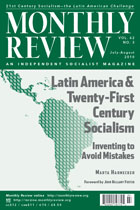Why Catalonia stood up on July 10

By Dick Nichols
Brazil: Left workers’ unity attempt fails

By Raul Bassi
July 11, 2010 -- An attempt to forge greater unity among militant union sectors in Brazil has imploded. The Working Class Congress (Conclat) was held in Sao Paulo on June 5-6 to try and bring together various radical union currents. The key forces behind the congress were Conlutas and Intersindical, both formed in opposition to the main union confederation, the Unified Workers’ Confederation (CUT).
The CUT unites approximately 60 million formal or informal workers out of a total population of 200 million, making it the biggest workers confederation in the continent. The CUT has had a very close relationship with the governing Workers Party (PT), both during its period of ascendency as it emerged out of the militant workers' struggles of the 1970s, as well as during its transformation to what it is today.
Thailand: Reporting from the ‘Red Zones’

By Lee Yu Kyung
July 11, 2010 -- On July 6, the Thai government approved the extension of an emergency decree in 19 provinces, which includes many in the heartland of the pro-democracy Red Shirts in the country’s north-east. The extension came a day after the Brussels-based International Crisis Group (ICG) recommended the government immediately lift the decree and hold fresh elections.
But Prime Minister Abhisit Vejajiva, who came to power through the army’s intervention, crushed hopes for new elections weeks ago.
There have been tireless efforts to silence critical voices before and after the bloody crackdown on the Red Shirts in May. The International Crisis Group said in a July 5 report that more than 2200 websites have been shut down for alleged violations to the Computer Crime Act since the state of emergency was imposed on April 7.
South African soccer: For the love of the game or of money and power?

By Dale T. McKinley, Johannesburg
July 7, 2010 -- The sun has almost set on the soccer World Cup and its seeming suspension of our South African "normalcy". No doubt, many will try their best to continue to bask in its positively proclaimed "developmental legacy"; but, as sure as the sun will rise on the morning after, so too will the reality of that "normalcy" bite us like an unhappy dog. Nowhere will this be more apparent than in the world of South African soccer itself.
Classic cartoon by Fred Wright: `How much do you pay your boss?'

Drawing on the American Labor movement – Fred Wright (1907-1984) was one of the United States’s most renowned labo

Frelimo poster for its third congress in 1977.
Barry Sheppard reviews Peter Camejo's `North Star -- A Memoir'
North Star – A Memoir
By Peter Camejo
Haymarket Books, Chicago, 2010
Timor Leste and Australian activists reject Australian government's racist refugee policy

Statement by Luta Hamutuk, Timor-Leste Institute for Research, Advocacy and Campaigns
Sosialis Australia Tolak Rencana Pusat Suaka di Timor Leste

Oleh: Data Brainanta
8 Juli 2010 -- Berdikari -- Aktivis partai Aliansi Sosialis (Socialist Alliance – SA) di Australia menolak rencana PM Julia Gillard untuk membangun pusat pemrosesan suaka regional di Timor Leste.
Kandidat SA dari Perth, Alex Bainbridge, menggambarkan bahwa rencana menampung pencari suaka Australia di Timor Leste bukan didasarkan atas belas kasihan dan keadilan, sebagaimana dikatakan oleh PM tersebut, melainkan untuk mendorong pemenjaraan lebih banyak lagi.
“Kebijakan yang sesungguhnya kita butuhkan adalah yang berdasarkan belas kasihan dan rasa keadilan – yakni menempatkan mereka di tengah-tengah komunitas [masyarakat] Australia,” kata Bainbridge.
“Fakta sederhananya, pemenjaraan adalah pemenjaraan – apakah pemenjaraan itu di Pulau Christmas atau Leonora, Timor Leste atau Nauru,” tambahnya.
South Africa: FIFA forbids free speech at World Cup

By Patrick Bond
July 7, 2010 -- Acting against our alleged "ambush marketing" and "incitement" (sic), the South African Police Service, newly augmented with 40,000 additional cadre for the World Cup, detained several of us here in Durban last weekend. We were simply exercising freedom of expression at our favourite local venue, the South Beach Fan Fest, whose half-million visitors is a record.
Wearing hidden microphones so as to tape discussions with police leadership, what we learned was chilling, for they have received orders from Durban city manager Mike Sutcliffe that the property rights of the world soccer body, the Fédération Internationale de Football Association (FIFA), overrule our foundational constitutional rights.
“We can charge you and detain you until the 11th of July, [when] FIFA is over!”, a top officer shouted at me during my second interrogation, on Saturday, July 3.

